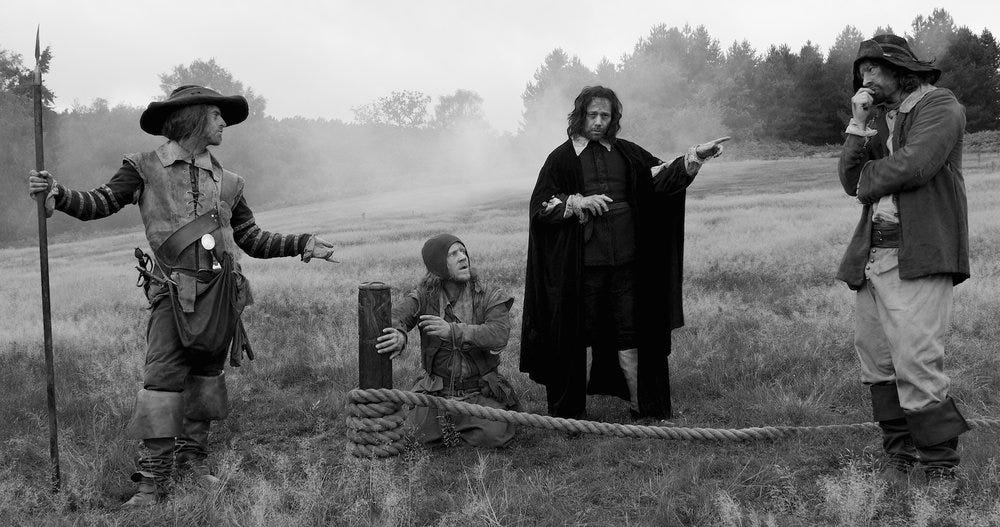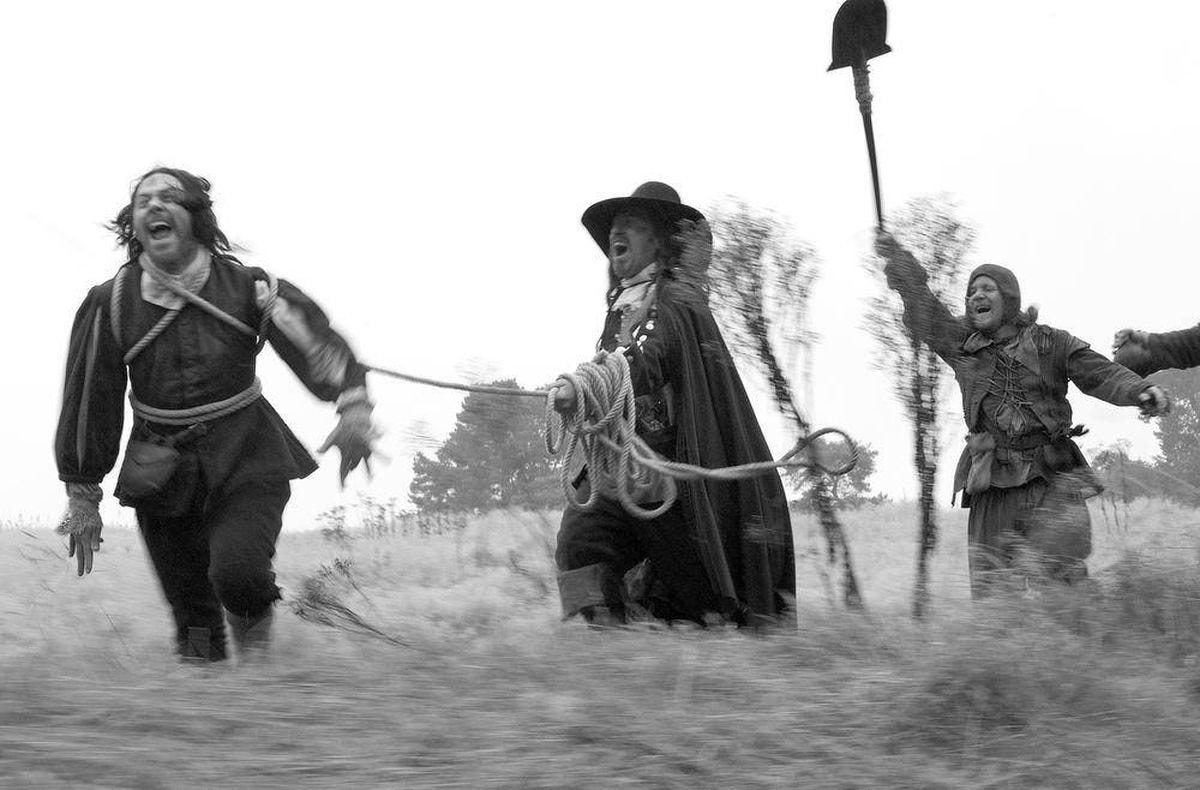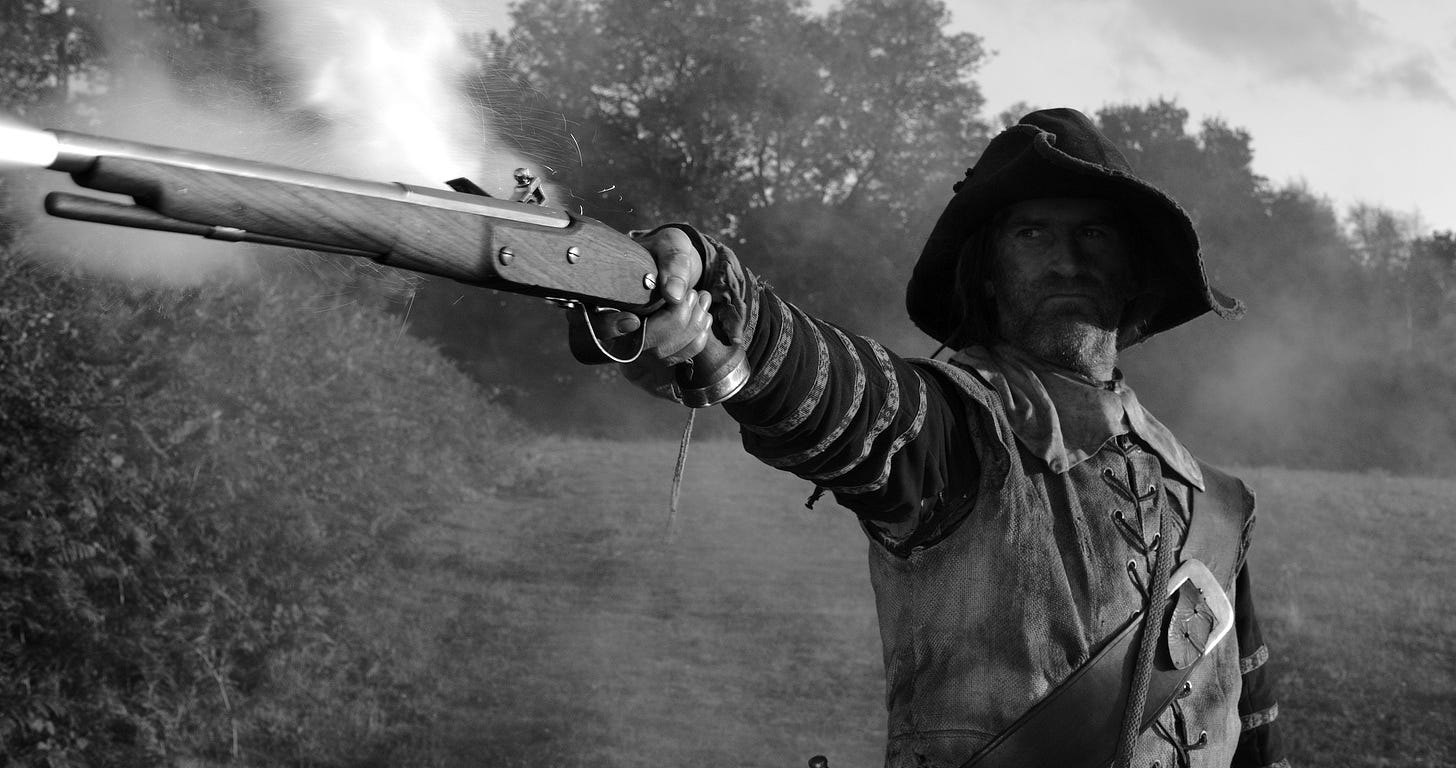Film Review: A Field In England (2013)
---(SPOILERS)--- this film is a slow-burn that takes you on a rollercoaster of visceral feelings. well-acted, and a total trip-fest, A Field In England is criminally underrated.
BIO FROM IMDB: Amid the Civil War in 17th-century England, a group of deserters flee from battle through an overgrown field. Captured by an alchemist, the men are forced to help him search to find a hidden treasure that he believes is buried in the field.
A Field In England is not the kind of movie you throw-up to kill time. The disconnect between the suspension of disbelief and CGI-manifested film has moviegoers caught in a Schrödinger-type conundrum with criticism. This film answers that problem without obtuse CGI.
The usual popcorn movie viewers might brush over this flick about the English Civil War. Frankly, none of the film relates to that conflict. This film is not for people who watch movies just to be entertained; it’s flavor is so much more complex than that. A Field In England has a slow build-up, not quite revealing too much of anything. The narrative keeps your attention by dropping you directly into the mushroom-filled haze of the second act, and by the time you hit the end you can’t help but take a breath of relief. And think.
The IMDB description really doesn’t do the plot complexity justice. This film has deep layers, from folk horror to dark comedy to indie bombshell. A Field In England begins in the chaos of a devolving battle, with the protagonist Whitehead (Reece Shearsmith) being chased through a hedgerow. He is saved by a scrappy soldier named Cutler (Ryan Pope) who lures the protagonist, as well as two fellow deserters, away from the battle and toward what is supposedly a nearby alehouse.
The deserters, Jacob (Peter Ferdinando) and Friend (Richard Glover), provide a good balance from the paranoid Whitehead and the elusive Cutler; they also contribute to a wholesome group vibe that comes to fruition in the final act. The menacing Wizard O’Neill (Michael Smiley) completes the circuit, with possibly the most perplexing character entrances to a narrative that I’ve seen—fitting for an alchemist. The antagonist has so little screen-time, yet his stark image still lives in my nightmares.
I’ll start with a discussion of the things I liked about the story as-is, then I’ll go into a more expanded analysis of the accomplishments of the filmmakers on the actual composition and editing. Lastly, and hopefully without a novel to follow, I’ll talk generally about things in the movie I loved and hated. The one of the marks of a great film is that it prompts articulate analysis. There are plenty of truly awesome parts to this film, but I don’t want to spoil everything.
Amy Jump, who also wrote the screenplay for Kill List (2011), penned this script for director Ben Wheatley. Wheatley also directed Kill List, and his style of psychosis cinema and paranoid editing have found a comfy home in A Field In England. I enjoyed the story’s evolution. It begins with a kind of chaos from which the characters are ejected and put on their journey. The character writing is great, with the actors parrying an authentic performance alongside a hybrid system of old and new mannerisms that keep the dark humor grounded in the period.
Wheatley and Jump are smart to keep the dialogue to a minimum throughout the first act. The second act reveals through the ingestion of magic mushroom soup that the remainder of the narrative will operate in the throws of a hard trip. Cutler convinces everyone but Whitehead to eat his countryside mushroom soup, and once they begin to feel the effects you can sense a full movement into the visceral space.
My only criticism of the writing is that it struggles to keep up with the background mood. I’m talking mostly about the dialogue of all the characters in the final act. Not to pick it to pieces, but the second act transitions into the beginning of the third act in a confused manner. The visceral element maybe has been given too much power in this part of the plot; again, a hard nitpick, but the flow is very unstable leading into the last act. That point in the narrative is a tough connection because the characters are all kind of separated out doing their own things before they come back together again for the crescendo. Plenty of movies have troubles closing down plot lines while maintaining overall story integrity, though.
The artistic style of the film is undeniably the strongest part of the experience. The viscerally-imbued tone helps the viewer sink into the depths of the psilocybin trip along with the characters. Shooting in black and white was a brave move; I’ve seen some critics claim that it was probably because other artsy films at the time shot in black and white, like The Artist (2011). For a dark comedy based in a historical period, black and white could have blown up in their faces. To double down, a period-piece through the lens of magic mushrooms, but without color, is a tall order.
Wheatley and his Director of Photography delivered a masterpiece given those limitations. A Field In England utilizes every element of filmmaking to work against the lack of color—the costumes and props are top-notch, the brilliant use of depth, the refreshingly authentic (and not) performances from the actors. It was a wise choice to shoot in the beautiful countryside of Surrey, where anyone could easily imagine the colors popping even in black and white. Without color, Wheatley effectively communicated the forces of alchemical magic and psilocybin trips though visual texture, editing tricks, and the use of varied light intensity.
I might be fanboying a bit, but the most impressive thing I saw was the living portrait shots. At various points through the film, the players are simply posed in frame like a living portrait. While the camera pans and tracks, the actors stand absolutely still in the moment. What a crazy idea; I want people to see my film as trying to connect with history, but also it has to be a wild meme because this is a dark comedy that has already gone beyond the typical historical drama—the answer, to inject these sequences of framed posturing, is a masterclass in performative art within a film, and the double meme compounds with their postures correlating to the historical period they are portraying in the film. Mind funk.
I disagree with critics from the time that disregarded this film as something like ‘trying to be Apocalypse Now (1979), but in hedgerows instead of the jungle’. I see where they are coming from—the characters leave their world at the beginning and are placed into a setting so idyllic that I found myself wondering if they had died and this was the afterlife. It’s fairer in my opinion to identify that thing both of these films share is ultimately a journey from understood reality into the wild unknown.
My opinion is that this movie, like Apocalypse Now, requires the viewer to trust it, requires that the viewer is willing to see with an open mind. The classification of this film by critics as experimental is well-earned, but for all the talk of it’s experimentation too few seem to care what of the results?
Is not the inclusion of the “still-life” sequences very cool—either an attempt to literally recreate history or an ultra-meta admittance of how stiff and derivative trying to recreate or understand that history can be? Is not the narrative somewhat Canterbury Tales-esque? The whimsy alongside the crushingly visceral transition to psychedelic would have made Chaucer proud, even if he didn’t quite understand it. The flow is there, and strong.
The inclusion of alchemy was the genius lynch pin for this entire film. The concept blends with the mushroom trip element to create a commendable look at this understudied time period. Putting my nerd cap on for a moment, this 17th century setting was a dynamic period—in many ways it gave birth to what we have in the modern period, but rationality had not fully disconnected people from their belief in magic. British monarchs up to the war this film is based on employed court alchemists to create vitality potions and divine other signs, or even tell the future.
A Field In England resonates so well with a modern audience because it allows the magic into the narrative organically through light editing techniques and great performances. The key is the mushrooms; anyone who has tripped knows that the sidelining of reality can put you in a state where new possibilities abound. The film’s exploration of alchemy as heritage is very subtle; first by making it the key magical focus through which conflict between protagonist and antagonist materializes, then linking it to heritage by placing it at the hands of skilled practitioners, and finally by linking it to reality through the bent lens of a drug trip.
Being trapped plays heavily throughout the film—literally under armed escort, forced to work at gunpoint, trapped in a dug-hole filled, hiding to dodge bullets. Alongside this, you have the dark comedy aspects coming through, especially in the writing, that give the work a kind of ‘Monty Python on acid’ vibe—I think of Friend’s last message to his wife before dying.
I could talk shop on this forever, which is the hallmark of a good film for me. I’ll give A Field In England 4/5 stars. I think it’s imperfections are the result of the filmmakers focusing more on delivering the experimental portions of the narrative in-full and focusing less on the minor writing/narrative bits that would tie a typical film story together. They lost focus on some of the simple stuff because they didn’t want to miss the mark on their loftier goals; I would say it was a wise choice. The weird parts of the film land so hard, and the whole experience leaves you thinking about a re-watch.









